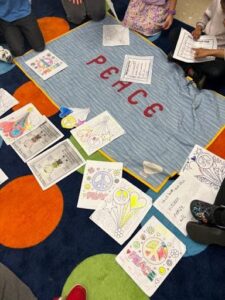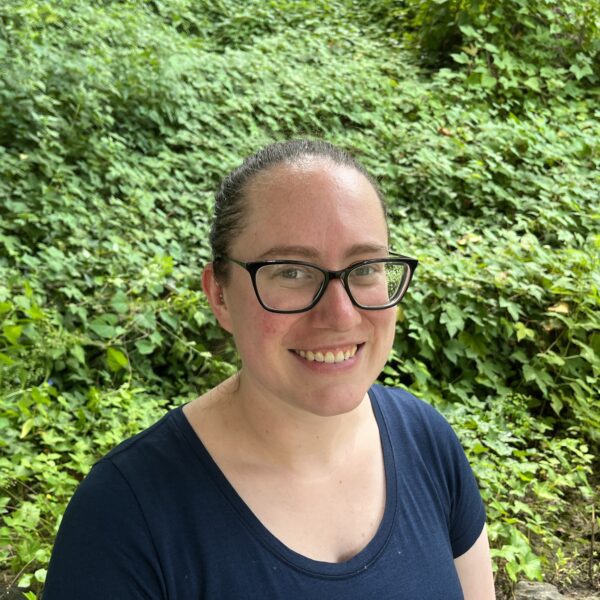Transformation

Editor’s note: Transformed through her intentional peace ministry with Little Friends for Peace, DC Service Corps volunteer Erin Frances Reinhart shares an experience of collective transformation for her students, her colleagues, and herself.
Alexandria City Public Schools offers high-quality after-school programming at schools and community-based sites through Linking Instruction Nurturing Knowledge (LINK) Club. Link Clubs aims to meet the needs of the whole child. They strive to create a safe environment where students receive academic tutoring, engage in hands-on learning activities, and receive social-emotional support. During my year of service, Little Friends for Peace (LFFP) has facilitated Peace Circles at six sites as part of the LINK club program. Although I have had opportunities to visit many of the sites, the LINK club at Brent Place Apartments was particularly transformational.
As I entered the multi-purpose room on the first Friday of programming at Brent Place Apartment, I was charged by twelve students, all competing for my attention. I eventually made my way to the open area within the room and began trying to get the students seated so we could start the Peace Circle. Getting all the children to sit in a circle was a monumental challenge. They all wanted to sit next to an LFFP staff member or volunteer. When this was impossible, a couple of children started crying. Others tried to run away from the circle, resulting in other children moving to take their seats. Still, others were in a power struggle to control the whole group. When we finally got everyone seated and began introducing ourselves, I noticed that one student, B, was unwilling to share her name with the group. On our first day, the total duration that we sat together in the Peace Circle was less than five minutes, and for me there was very little Peace experienced during that time.
On the next two Fridays, we changed our strategy to try to meet the attention needs of the children. We spent very little time as a whole group in a Peace Circle but instead broke into small groups with each staff member and volunteer taking one or two students. We then sat with the children and gave them our full attention as they worked on art projects. I was paired with B. As she colored in doves and peace signs, I asked her questions such as what she had learned in school that week, who was in her family, what she liked to do in her free time, who her friends were, what she wanted to be when she grew up, what her favorite things were, and countless other questions. As we spent time together, we slowly connected. I could tell she was slowly beginning to trust me as she volunteered more and more information about herself.
 During the sixth and final Friday, to our amazement, the students sat in the Peace Circle for an entire 45 minutes. Unprompted, each student began sharing something they were proud of, and we celebrated each of their accomplishments. Some students sang songs they were preparing for a play at their school. Others shared assignments they had received good marks on, art projects they had made, and stories they had written. When it was B’s turn to share, I had her face me so she was not looking at the rest of the group and prompted her with questions about her coloring. Suddenly, she got up, and I worried I may have pressed her to share too much. She returned with a plant and willingly shared with the entire group that she had planted it at school and was excited to watch it sprout and grow into a flower.
During the sixth and final Friday, to our amazement, the students sat in the Peace Circle for an entire 45 minutes. Unprompted, each student began sharing something they were proud of, and we celebrated each of their accomplishments. Some students sang songs they were preparing for a play at their school. Others shared assignments they had received good marks on, art projects they had made, and stories they had written. When it was B’s turn to share, I had her face me so she was not looking at the rest of the group and prompted her with questions about her coloring. Suddenly, she got up, and I worried I may have pressed her to share too much. She returned with a plant and willingly shared with the entire group that she had planted it at school and was excited to watch it sprout and grow into a flower.
This transformation was only possible because each volunteer invested time and energy in building relationships with each of the children. When one of the children became distracted or needed a little attention, the LFFP volunteers could quietly provide for that need and get them refocused. Not only did B and the students undergo a transformation from week to week, I observed how the LFFP volunteers were transformed through this experience. Many of the volunteers were new. They all grew in their ability to connect with the students and quickly get them refocused on the goal. I also was transformed through this experience. Seeing how desperate the children were for attention led me to question why this was the case. I placed some amount of fault on the child’s adult family members. However, when they came to pick up the children, I could see how depleted their caregivers were. They were doing the best that they could, and it was the systemic injustices that had failed these children.
From this experience, I witnessed transformation within B, the other children, the LFFP volunteers, and my own heart. Yet, do we enter into every encounter with an openness to being transformed? Do we spend time reflecting on how our daily experiences transform our lives or the lives of others?
Question for reflection: what experience or relationship is calling you to transformation?
Tagged in:

